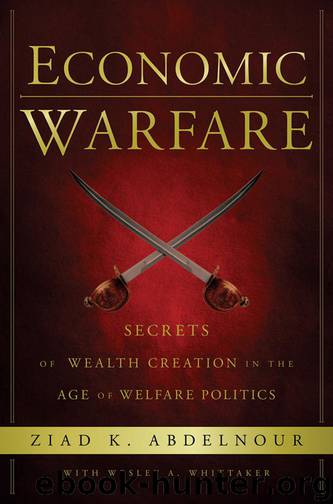Economic Warfare by Ziad K. Abdelnour; Wesley A. Whittaker

Author:Ziad K. Abdelnour; Wesley A. Whittaker
Language: ru
Format: mobi
Publisher: John Wiley & Sons, Ltd.
Published: 2011-11-16T20:00:00+00:00
Is Free-Market Capitalism Dead?
Is free-market capitalism, as historically practiced in the United States, still alive, or is it now just a footnote in our economic history? Americans have traditionally believed that the invisible hand of the market means that capitalism will benefit all of us without requiring any oversight. However, Adam Smith never said nor did he believe in a magically benevolent market that operated for the benefit of all without any checks and balances. He railed against monopolies and the political influence that accompanies economic power, worrying about the encroachment of government on economic activity; but his concerns were directed at least as much toward parish councils, church wardens, big corporations, guilds, and religious institutions as to the national government, since these institutions were part and parcel of eighteenth-century government. Smith was sometimes tolerant of government intervention, especially when the object is to reduce poverty.
“When the regulation, therefore, is in support of the workman,” Smith passionately argued, “it is always just and equitable; but it is sometimes otherwise when in favor of the masters.”7
He saw a tacit conspiracy on the part of employers “always and everywhere” to keep wages as low as possible. While Adam Smith may have been the father of free-market economics, he argued that bank regulation was as necessary as fire codes on urban buildings and called for a ban on high-risk, high-interest lending—the eighteenth-century version of the subprime loan.
Rama Cont, one of the leaders of the new science of financial modeling, recently asserted his belief that Adam Smith was wrong about the “Invisible Hand.”8 Specifically, investors in financial markets rationally pursuing individual profit can produce outcomes that are bad for almost everyone. Simple forecasts can also be mistaken, argues Cont, if they fail to account for the actions of market participants themselves. Investor strategies can influence prices, which in turn influence future strategies in a feedback loop that can cause considerable instability.
Cont recalls the severe stock market crash of October 1987, which seemed to strike out of the blue, since nothing significant was happening in the real economy. Subsequent research, though, blamed the crash in part on a new investment strategy, “portfolio insurance,” which a large number of fund managers had simultaneously adopted.
Based on the famous Black-Scholes options-pricing model, a quantitative mathematical formula that is used to price stock options, this strategy recommended that fund managers reduce their risks by automatically selling shares whenever their values fell. But the approach didn’t take into account what would happen if many investors followed it simultaneously; a massive sell-off that could send the market plummeting. The 1987 crash was thus not provoked by events in the real economy but by a supposedly smart risk-management strategy—and the current downturn, of course, also derives at least partly from a global craze for a seemingly foolproof financial innovation.
Investors in financial markets rationally pursuing individual profit, then, can produce outcomes that are globally negative. Doesn’t that contradict classical economic theory?
“Both theory and empirical facts do tend to show that,” says Cont. “On
Download
This site does not store any files on its server. We only index and link to content provided by other sites. Please contact the content providers to delete copyright contents if any and email us, we'll remove relevant links or contents immediately.
International Integration of the Brazilian Economy by Elias C. Grivoyannis(75574)
The Radium Girls by Kate Moore(11632)
Turbulence by E. J. Noyes(7715)
Nudge - Improving Decisions about Health, Wealth, and Happiness by Thaler Sunstein(7259)
The Black Swan by Nassim Nicholas Taleb(6781)
Rich Dad Poor Dad by Robert T. Kiyosaki(6190)
Pioneering Portfolio Management by David F. Swensen(6088)
Man-made Catastrophes and Risk Information Concealment by Dmitry Chernov & Didier Sornette(5663)
Zero to One by Peter Thiel(5502)
Secrecy World by Jake Bernstein(4401)
Millionaire: The Philanderer, Gambler, and Duelist Who Invented Modern Finance by Janet Gleeson(4112)
The Age of Surveillance Capitalism by Shoshana Zuboff(3995)
Skin in the Game by Nassim Nicholas Taleb(3977)
The Money Culture by Michael Lewis(3855)
Bullshit Jobs by David Graeber(3842)
Skin in the Game: Hidden Asymmetries in Daily Life by Nassim Nicholas Taleb(3735)
The Dhandho Investor by Mohnish Pabrai(3571)
The Wisdom of Finance by Mihir Desai(3537)
Blockchain Basics by Daniel Drescher(3337)
